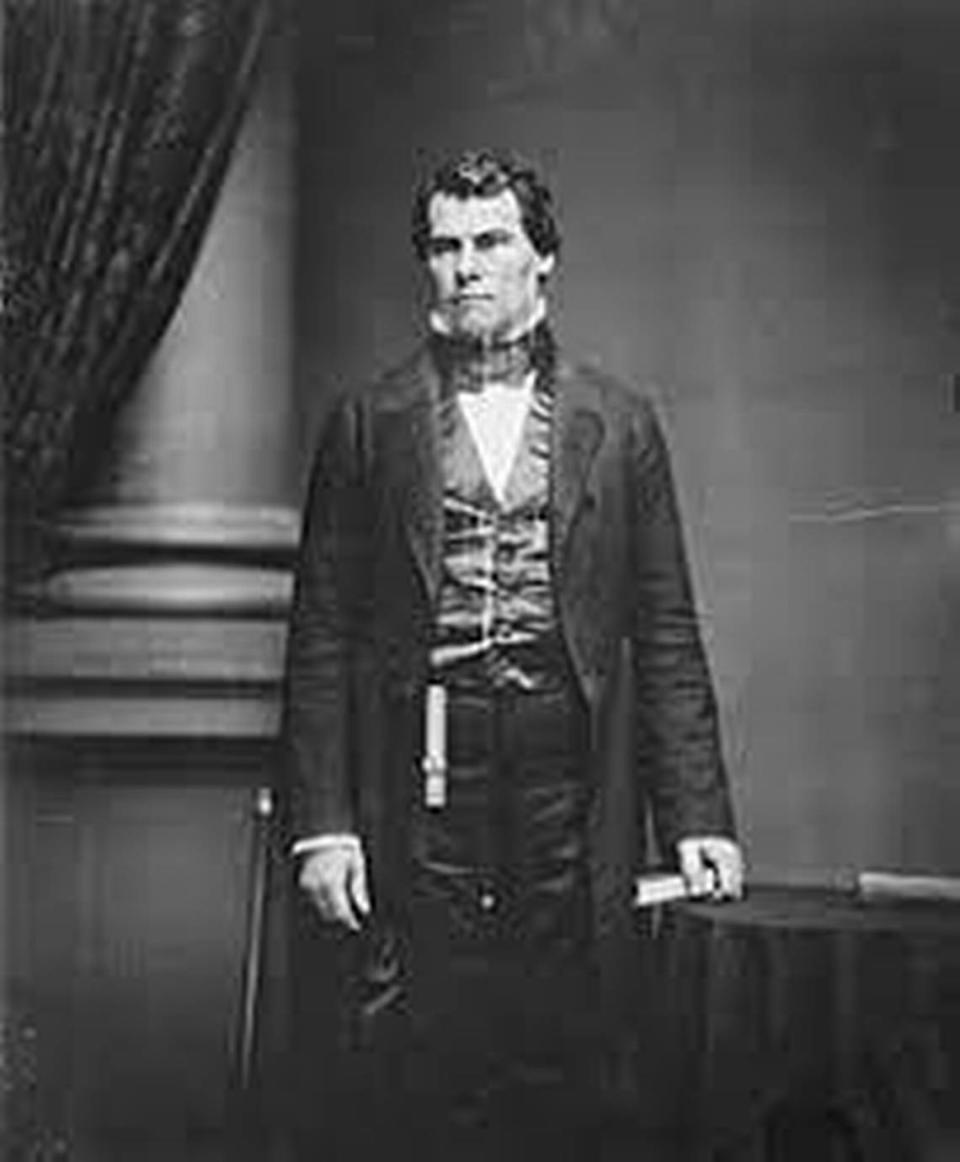He was a founding father of Fort Worth, but he wasn’t so popular with nearby settlers
Bvt. Maj. Ripley Arnold was Fort Worth’s founding father in 1849, remembered today as a historic figure memorialized with a statue in McMillan Plaza along the Trinity River downtown.
Yet when he was commander at Fort Worth, he was not beloved by all the locals, not for anything personal but because he represented certain unpopular practices of the U.S. Army of his day.
One of those practices was cutting timber on nearby lands. Army policy with frontier posts like Fort Worth was to establish a “reservation” around the post where, among other rules, alcohol could not be sold and civilian sutlers were granted a concession to sell to the troops.
Also part of every reservation was a “timber reserve” where the garrison could get the essential wood needed for fuel and construction. The timber was off-limits to civilians.
Problems arose when the timber was on land claimed by a civilian, which put him at odds with the Army. The problem was not new with Fort Worth. In November 1848, seven months before Arnold and his men arrived on the Trinity, Maj. Gen. David Twiggs, commanding in Texas, complained to his superiors that there was “some difficulty” locating posts on the northwest frontier because the land had already been “surveyed and located” for more than a hundred miles in advance of settlement, and the owners were nervy enough to “demand and expect” to be paid rent if the Army moved in.
The Army went ahead and placed its posts where it wanted, figuring settlers would be glad to have the Army’s protection and that the government would win any legal dispute.
In 1851, Lt. Samuel Starr, Arnold’s acting assistant quartermaster, informed the War Department that fuel was “abundant and easily obtained” at Fort Worth. He added that, “No claim for fuel has yet been made, nor will any be admitted until the claimant shall produce a clear title to the land.”
Thus, post commanders like Ripley Arnold were under orders to pay for timber only if the homesteader could “prove up” title to the land. If not, he was a “squatter,” and the Army was not obligated to pay anything. Naturally, the homesteaders did not see things that way.
In 1851, Arnold was sued by Louis Cohen for timber cut on his property by Arnold’s troops. He claimed 50,000 trees had been cut down since the post was established, which he valued at $2,000. For months Arnold beseeched the War Department to provide him with legal counsel to defend himself. While waiting for the wheels of the War Department to turn, he was forced to pay lawyers out of his own pocket — $50, which was more than twice what he was paid per month as a U.S. Army major.
The Army eventually came to Arnold’s assistance. It was not easy to find a lawyer who would handle a military officer’s case because the government was notoriously slow to pay – when it did pay.
Arnold was fortunate with his legal counsel, getting not just one but two distinguished lawyers who agreed to represent him: John H. Reagan and John C. McCoy. Reagan was one of the leading members of the legal fraternity in Texas, already a district judge and soon to be elected to Congress before ultimately joining the Confederate cabinet of Jefferson Davis during the Civil War. McCoy, of Dallas, was so highly regarded, the whole town shut down for the funeral of “Col. McCoy” in 1887.

The case was heard in Henry Daggett’s store, located “under a giant oak tree at the foot of [what later became] Samuels Ave.” It did double duty as Fort Worth’s first courtroom. The presiding district judge was Oran M. Roberts, future chief justice of the state supreme court and governor of Texas (1879-1883). The case came to trial in the spring of 1853.
A civilian jury of “twelve good men and true” found in Arnold’s favor, a surprising outcome considering the often-prickly relations between civilians and the Army.
Cohen’s lawsuit was not the only dispute with local settlers over timber cutting. It was just the only one to go to trial. Frenchman Adolphus Gounah (or Gouhenant), who considered himself a personal friend of Ripley and Catherine Arnold, presented the major with a bill for $4,000 for timber cut on his “survey.” That timber was used to construct the post buildings, including the stable, hospital, and officers’ quarters. Arnold approved the claim, but it was never paid, reportedly due to “informality in its preparation.”
The Army closed Fort Worth in the summer of 1853, sending its garrison west to Fort Belknap and Arnold back to Fort Graham, where he was shot and killed on Sept. 6, 1853. It is doubtful either he or his widow were ever reimbursed for his legal expenses.
The Army sought to avoid future difficulties with its frontier posts such as Ripley Arnold had encountered. Timber cutting had not been an issue when posts were placed on empty land, but the land under Fort Worth had already been patented by the Peters Colony before the Second Dragoons arrived in June 1849. To prevent future legal imbroglios, in future lease agreements for frontier forts, the Army included a clause reserving for the United States the right to “cut and use any timber or other material which may be found upon the land” it claimed.
Ripley Arnold’s brush with civil law was a vexing episode in the military career of our founding father but would not even rate a footnote in the history of Fort Worth if not for the other distinguished figures that were part of the story.
Author-historian Richard Selcer is a Fort Worth native and proud graduate of Paschal High and TCU.

